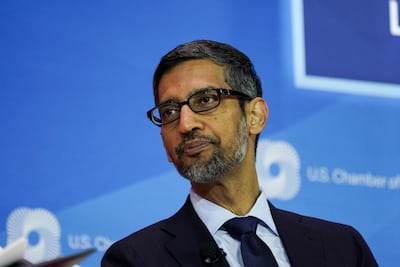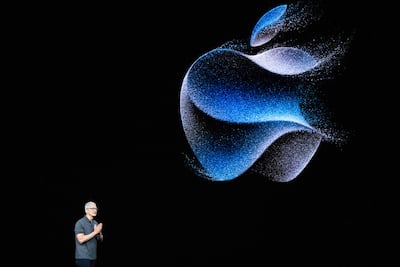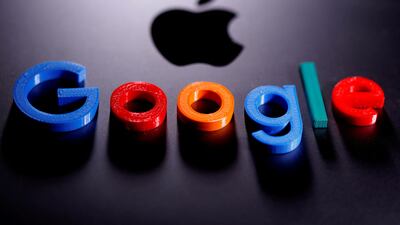Late last month, Apple provided a significant indication of its intentions regarding artificial intelligence. Chief executive Tim Cook announced the company's intentions to reveal more details on this matter later in the year.
It makes perfect sense, therefore, that Apple and Google are reportedly collaborating to employ Google's Gemini AI technology on Apple's coming flagship devices, expected to be the iPhone 16 series.
If it indeed pushes through, the partnership is projected to be a seismic one for the industry – merging arguably the most influential tech company, the world's most-dominant internet body and the seemingly endless reach of AI – generative AI, in particular.
Analysts expect iPhone sales to benefit from the collaboration, arguing Apple's penchant for perfection and Google's drive to redeem itself from Gemini's recent debacle.
They argue that given Apple's efforts to build a rock-solid reputation for the iPhone, it would be the perfect device to put generative AI into the hands of more consumers.
"Smartphone consumers are still curious for AI tech but have doubts into full functionality and superior experience that can be offered by AI," Ramazan Yavuz, senior research manager at the International Data Corporation, told The National.
"Apple has best expectations in this regard from its loyal customer base and co-operation with Google will be a sign new iPhones will be delivering the magic moment."
Frenemies and no strangers to each other
To start off, Apple and Google aren't strangers to each other when it comes to partnerships – even if they've tangled in the courtroom a number of times before, such as in a 2010 showdown, in which they accused each other of infringing on their respective tech.
However, working together seems to be better: the best example would be Google being the default search engine for Apple's Safari web browser, which has been in place since 2002 and for which the former has reportedly paid billions over the years.
The actual percentage was accidentally revealed by Google's senior economics expert, Kevin Murphy, during his testimony for the company's antitrust defence in Washington in November, in which he said Apple receives 36 per cent of Google search revenue on Safari.
This forced Sundar Pichai, the chief executive of Google and its parent Alphabet, to confirm the figure, which reportedly translates to more than $2 billion annually.
The reported Apple-Google partnership "can be termed the biggest AI deal" and could be "a significant milestone in the tech industry, akin to the landmark deal that made Google the default search engine on iPhones", Andreas Hassellof, chief executive of Switzerland-based technology consultancy Ombori, told The National.
Push of a button?
If plans indeed push through, Apple would introduce generative AI features on iOS 18, the coming version of its mobile operating system that is also traditionally installed on new iPhones.
How, or even when, Gemini AI will feature on iPhones, in one way or another, is still unclear. Rumours suggest Apple could add another dedicated button, which could be used for accessing AI features.
Apple and Google routinely do not comment on speculation.
Two options are available: either Gemini AI comes embedded as part of iOS, or accessed through Google's own apps and services. It's also unclear what would happen to Siri, Apple's very own AI-powered digital assistant.
Keep in mind that Google has already collaborated with Samsung Electronics for using Gemini AI on the latest Galaxy S24 smartphones, providing a hint of what could come with iPhones.
The rumoured dedicated AI button could be "signalling Apple's commitment to advancing AI technology on their devices", Mr Hassellof said.
Is there pressure on Google to shape up?
Apple is highly protective of its software ecosystem and it would be unsurprising if it is working with Google to ensure no flops would happen if it is to use Gemini AI on its iPhones.
Last month, Google drew fire following criticism on Gemini AI's mishandling of racial issues and inaccuracies in some “historical image generation depictions”, forcing it to suspend the service and prompting Mr Pichai to admit to shortcomings.
This puts "significant pressure" on Google to completely fix Gemini AI, as this would be critical to the success of both companies' strategies, particularly Google's, according to Mr Hassellof.
Revamping Gemini AI "is now a top priority for Google, given past disappointments and controversies surrounding the product. Getting Gemini right is crucial for Google's future", he said.
Conversely, Google's advanced expertise in AI will "speed Apple’s efforts to equip multiple AI technologies in the next rollouts of iPhone series", Mr Yavuz said.

Google would also have to watch out from all fronts, especially considering other generative AI players – smartphone manufacturers and AI service providers alike – are boosting their arsenal, but Apple may have an advantage with such a huge deal.
"As competition heats up and AI offerings become more alike, securing distribution channels like becoming the default AI on iOS becomes crucial," Mr Hassellof said.
"We now see that phone makers prefer to control over their own AI, but Apple's collaboration might inspire similar partnerships. It'll be interesting to see if more companies team up with Apple's rivals in the future."
AI in more hands
About 170 million next-generation AI smartphones are expected to be shipped throughout this year, a considerable leap from the 51 million last year and which would represent nearly 15 per cent of total shipments, according to preliminary forecasts from the IDC.
Apple has appeared to be slow to the AI game but this isn't anything new, as the company has somewhat of a strategy to hold out before it launches its own take on new innovations to make it look "cool"; it wasn't the first to put several camera lenses on phones and it hasn't even released a foldable device.

The integration of a powerful generative AI tool on iPhones would "contribute significantly to the AI smartphone penetration in 2024", Mr Yavuz said.
And it is entirely possible Apple could hit record volumes in its next generation of iPhones – if a powerful, flawless Google-powered AI is used, he added.
This will offer a "brand new and exciting feature to Apple consumers who compared iPhones to premium phones in Android and found them less equipped in multiple spec comparisons".


